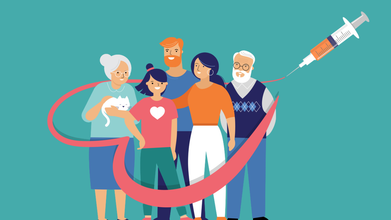- Health Conditions A-Z
- Health & Wellness
- Nutrition
- Fitness
- Health News
- Ayurveda
- Videos
- Medicine A-Z
- Parenting
Super Bowl Indulgences That May Harm Your Prostate Health

Superbowl (Credit: Canva)
Superbowl is just around the corner and your brain is probably fixed on what you should be eating that day. Popcorn, cookies, sodas, alcohol and whatnot, the market is brimming with snacks. However, things might not be the same for individuals with prostate problems to whom this indulgence in snacks and drinks can pose health risks. Prostate glands are small yet extremely vital parts of the male reproductive system as they produce semen. Thus, it becomes extremely important to prevent and manage prostate issues.
Here are some Super Bowl foods to avoid for better prostate health
Processed Meats And Red Meat
If you’re attending a Super Bowl party, you'll likely encounter a spread of processed meats and red meat, from hot dogs to cheeseburger sliders. Unfortunately, these foods should be avoided if you have prostate issues. A 2022 meta-analysis published in Frontiers in Nutrition links red and processed meats to an increased risk of prostate cancer, as well as other cancers, such as colorectal and pancreatic cancer. These meats often contain carcinogens that can contribute to the development of cancer, so it's best to skip them during your Super Bowl feast.
Saturated Fats
Saturated fats, commonly found in fried foods, cheese, and baked goods, should be limited when you have prostate concerns. According to a 2014 study in Nutrients, regular consumption of saturated fats can elevate the risk of prostate cancer. The study highlights that prostate cancer survivors should stick to low-fat diets, avoiding saturated fats like those found in fatty cuts of meat, dairy products, and processed snacks. Excessive intake of saturated fats can also increase the likelihood of advanced and fatal prostate cancer, as noted in a separate study published in Cancer Epidemiology, Biomarkers, and Prevention. For a healthier Super Bowl experience, choose foods lower in saturated fats, such as vegetables, whole grains, and lean proteins.
Alcohol
Though not technically a food, alcohol consumption during the Super Bowl is often part of the celebration. However, for individuals with prostate problems, drinking alcohol can be detrimental. A 2009 study published in Cancer found that heavy drinking increases the risk of prostate cancer. Men who consume more than 20 alcoholic beverages a week are twice as likely to develop prostate cancer as moderate drinkers. While it’s tempting to indulge in alcohol during the game, it's best to limit intake to no more than two drinks a day, as recommended by the US Dietary Guidelines. Moderation will help prevent alcohol-related health issues and support better prostate health.Tips For Healthier Super Bowl Eating
Opt for lighter, prostate-friendly alternatives when preparing for your Super Bowl gathering. Fresh vegetable platters, lean meats like chicken or turkey, and whole-grain snacks offer delicious and nutritious options. You can also incorporate more plant-based foods like legumes and tofu, which are linked to better prostate health. Staying hydrated with water or herbal teas instead of sugary drinks or alcohol will help reduce the strain on your body, ensuring you enjoy the game without compromising your health.
Flu Symptoms 2025: NHS Warns People With Certain Conditions Face Higher Risk

Credits: Canva
People living with long-term health conditions are among those being urged by the NHS to take a key step as concerns around flu continue to grow. Hospital admissions linked to influenza reached 3,140 by the end of last week, marking the highest level ever recorded for this point in the season and an 18% rise compared to the previous seven days.
NHS Urges People With Long-Term Conditions To Take Action Amid Flu Concerns
Sharing an update on X this afternoon, the NHS said: “Flu can be serious for those at high risk, including children, older adults and people with long-term conditions. 18 million people have had the free NHS flu vaccine, and it’s not too late to get protected. Book via your GP, pharmacy or the NHS App.”
Flu Vaccine Eligibility: Why Flu Vaccination Matters
Flu vaccines are designed to protect against influenza, which can be dangerous and, in some cases, life-threatening for certain groups. Each autumn or early winter, the NHS rolls out these vaccinations for people who are more likely to develop serious complications if they catch the virus.
Flu Vaccine Eligibility: Who Was Eligible From September 1?
Based on guidance from the UK Health Security Agency (UKHSA), six main groups became eligible for the flu vaccine from September 1 this year, with another six groups added from October 1.
From September 1, eligibility included:
- Pregnant women
- All children aged two or three years old on August 31, 2025
- Children with specific long-term health conditions, aged six months to under 18 years
- Primary school children, from reception through Year 6
- Secondary school children, from Year 7 to Year 11
- All children in clinical risk groups aged six months to under 18 years
Flu Vaccine Eligibility: Who became eligible from October 1, 2025?
From October 1, 2025, the following groups were also eligible:
- Everyone aged 65 and over
- Adults aged 18 to 65 with long-term health conditions
- Care home residents
- Carers receiving Carer’s Allowance, or those caring for an elderly or disabled person
- People living with someone who is immunocompromised
- Frontline health and social care workers
How And Where To Get Vaccinated?
The NHS App can be used to check vaccination eligibility. Flu jabs are available through GP practices, selected pharmacies, maternity services, and care homes.
The NHS also notes that health and social care workers may be offered the vaccine at their place of work. Flu vaccinations can be given at the same time as other jabs, including COVID-19 and shingles vaccines.
Commenting on the recent rise in cases, NHS National Medical Director Professor Meghana Pandit said yesterday: “While some parts of the country will be breathing a sigh of relief with flu cases not rising as quickly as feared, we are nowhere near out of the woods yet.
“Combined with the impact of strikes, a stream of winter viruses means many hospitals will be on high alert in the days ahead. But it remains vital that people continue to come forward for NHS care as normal.
“If you need urgent help, dial 999 in an emergency, or use NHS 111 for other care needs. And if you are eligible, please come forward for a jab, it’s not too late.”
Government Appeals To The Public
Health and Social Care Secretary Wes Streeting also addressed the situation, saying: “Flu continues to put significant strain on the NHS, with record numbers of patients in hospital, and frontline services remaining under enormous pressure. I’m appealing to the public to protect yourself and your loved ones by getting your flu jab.
“I want to thank NHS staff who are going above and beyond at the toughest time of year. Thanks to their hard work and careful planning, ambulance handovers are around eight minutes quicker than this time last year.”
Fact Check: Top 5 Flu Vaccine Myths In 2025, Busted

Credits: iStock
Is 2025 the year of Flu? This is the right question to ask as we see so many cases of flu from around the world, worst hit countries remain UK, US, and Canada. The hospitalization rates have gone up. In fact Dr Wenqing Zhang, Unit Head for Global Respiratory Threats at the Department of Epidemic and Pandemic Threats Management of the World Health Organization said that this year is marked by "the emergence and rapid expansion of a new AH3N2 virus subclade". This new variant is called J.2.4.1 or subclade K. This was first reported in August in Australia and New Zealand and has since been detected in over 30 countries.
Amid this there are many myths that surrounds the flu vaccine, on whether it should be administered and if one can get a flu despite getting the jab. Health and Me breaks those myths for you.
The biggest misconception that surround the vaccine right now is its effectiveness, since it has been updated before the new strain or the subclade K/ super flu hit the population. However, Professor Antonia Ho, Professor and Honorary Consultant in Infectious Diseases at the University of Glasgow says, "The vaccine remains the most effective means to prevent disease. We still want to encourage people to get the vaccine."
When a new variant emerges, the flu shot can still offer what doctors call cross-protection. In simple terms, the antibodies your body makes after vaccination can recognize similar flu viruses and respond to them.
Also Read: 186 H3N2 Outbreaks As Hospitalization Rates Double On Canada
Here are the top 5 flu vaccine myths in 2025
Myth 1: Influenza is not serious, so I don’t need the vaccine
Fact: Flu is far from harmless. Each year, up to 650,000 people worldwide die from flu-related respiratory complications. Even healthy individuals can fall seriously ill. In some cases, flu can lead to pneumonia, sinus or ear infections, and inflammation of the heart or brain, especially in those with weaker immunity.
Myth 2: The flu vaccine can give me the flu
Fact: The flu shot uses an inactivated virus, which means it cannot cause influenza. Some people may feel mild fever, body aches, or tiredness after vaccination. These symptoms are short-lived and are simply signs that the immune system is responding.
Myth 3: The flu vaccine causes severe side effects
Fact: Flu vaccines have a strong safety record. Serious side effects are extremely rare. Guillain-Barré Syndrome, a condition linked to muscle weakness and paralysis, occurs in about one in a million vaccinated people, making the risk very low.
Myth 4: I took the vaccine and still got the flu, so it doesn’t work
Fact: Many flu viruses circulate each season, and vaccines target the most common ones. While vaccination may not prevent every infection, it greatly reduces the risk of severe illness and complications. It also helps protect people with vulnerable immune systems.
Myth 5: I am pregnant, so I should not get the flu vaccine
Fact: Pregnant women are strongly advised to get vaccinated because pregnancy weakens the immune system. The inactivated flu vaccine is safe at any stage of pregnancy and helps protect both the mother and the baby.
Will The Old Flu Vaccine Protect You Against The New Subclade K?

Credits: iStock
While H3N2 flu cases are surging, one question that is being asked time and again is whether the old vaccines provide protection against this new variant. While the new strain of virus was detected after the vaccine had already undergone its update, the good news is that it still provides the best protection against the illness from H3N2 strains.
The real reason why concerns are prompted about the effectiveness of the seasonal vaccine is because the virus underwent more mutation than scientists expected over summers. This mutant is called the 'subclade K' or 'super flu'. While it is true that most cases this season are of the 'super flu' strain, experts say that the flu jab is still offering a strong protection.
How Effective Is The Flu Jab Against The New Flu Strain?
"The vaccine remains the most effective means to prevent disease. We still want to encourage people to get the vaccine," said Professor Antonia Ho, Professor and Honorary Consultant in Infectious Diseases at the University of Glasgow. Experts have stressed enough on the immunity that one can receive from the vaccine that that these flu jab remain the best defense against the flu, even though the current strain circulated may have drifted away from the strain included in this year's jab.
Data from the UK Health Security Agency (UKHSA) also show that vaccines is performing as expect, despite the emergence of subclade K.
How Is The Flu Jab Developed?
Every year, experts from the World Health Organization, the Centers for Disease Control and Prevention, and other global health agencies closely track flu trends around the world. They study which strains are spreading and use that data to predict which ones are most likely to dominate the upcoming flu season. The annual flu vaccine is then designed to protect against three or four of those strains.
It’s also worth understanding that more than one influenza A strain usually circulates at the same time. So even if the vaccine is not an exact match for a newer H3N2 strain, it still protects against other common flu viruses, which matters, notes Stony Brook Medicine.
When a new variant emerges, the flu shot can still offer what doctors call cross-protection. In simple terms, the antibodies your body makes after vaccination can recognize similar flu viruses and respond to them. You might still get sick, but the vaccine greatly lowers the chances of severe illness, hospitalization, or worse.
The vaccine offers protection against both types of influenza, including A and B.
Also Read: The New Flu Strain Emerged Too Late For Vaccines, And It Is Already Causing Outbreaks
Is There Any Difference Between Influenza A and B?
Influenza A
Influenza A changes quickly. Its genetic makeup shifts often, which is why new strains keep emerging and why it can trigger large outbreaks. It usually shows up early in the flu season and has been responsible for every major flu pandemic recorded so far.
Influenza B
Influenza B is more stable and does not change as rapidly from year to year. It tends to appear later in the season, often peaking in late winter or spring. While it does not cause pandemics, it can still lead to serious illness, particularly in children and young adults.
© 2024 Bennett, Coleman & Company Limited

